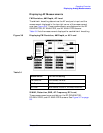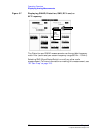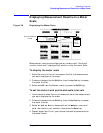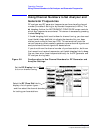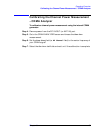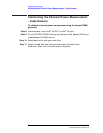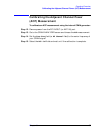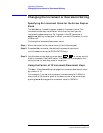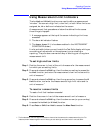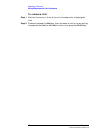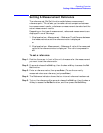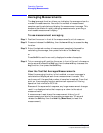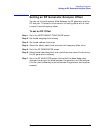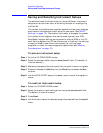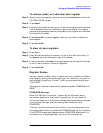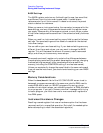
Chapter 3 65
Operating Overview
Using Measurement Limit Indicators
Using Measurement Limit Indicators
The
Lo Limit
and
Hi Limit
functions are used to define a measurement
“window.” You can set a high limit, a low limit, or both. When limits are
assigned, Lo, Hi or both are indicated on the screen.
A measurement that goes above or below the defined limits causes
three things to happen:
1. A message appears at the top of the screen indicating a limit was
exceeded.
2. The Lo or Hi indicator flashes.
3. The beeper beeps (if it is has been enabled in the INSTRUMENT
CONFIGURE screen).
Limits are helpful when you can’t watch the Test Set’s display while you
are making an adjustment on the equipment you are testing or
repairing. They are also a convenient way of alerting you to long-term
measurement drift.
To set high and low limits
Step 1.
Position the cursor in front of the unit-of-measure for the measurement
for which you are setting limits.
Step 2.
Press and release the
Shift
key, then the down-arrow key to access the
Lo Limit
function, and enter the measurement’s low-limit value and its
unit-of-measure.
1
Step 3.
Press and release the
Shift
key, then the up-arrow key to access the
Hi
Limit
function, and enter the measurement’s high-limit value and its
unit-of-measure.
1
To reset or remove limits
To reset a limit that has been exceeded
Step 4.
Position the cursor in front of the measurement’s unit-of-measure.
Step 5.
Press and release the
Shift
key, then the down-arrow (or up-arrow key)
to access the
Lo Limit
(or
Hi Limit
) function.
Step 6.
Press
Enter
or
Shift
then
Hold
to access the
Meas Reset
function.
1. The fundamental unit for the limits does not have to be the same as the measurement’s units. For
instance; when measuring AC Level in Volts, you can set high and low limits in units of dBm.



